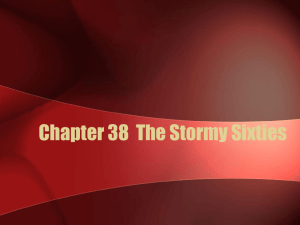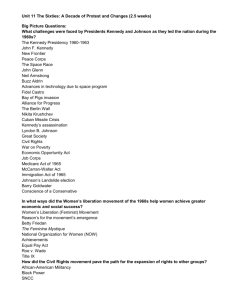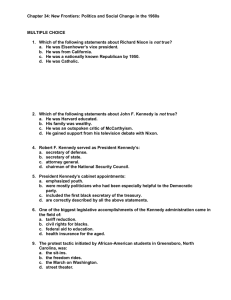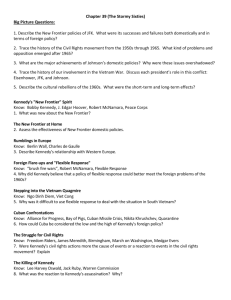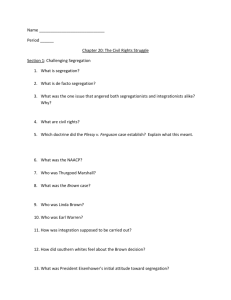The Stormy '60s
advertisement
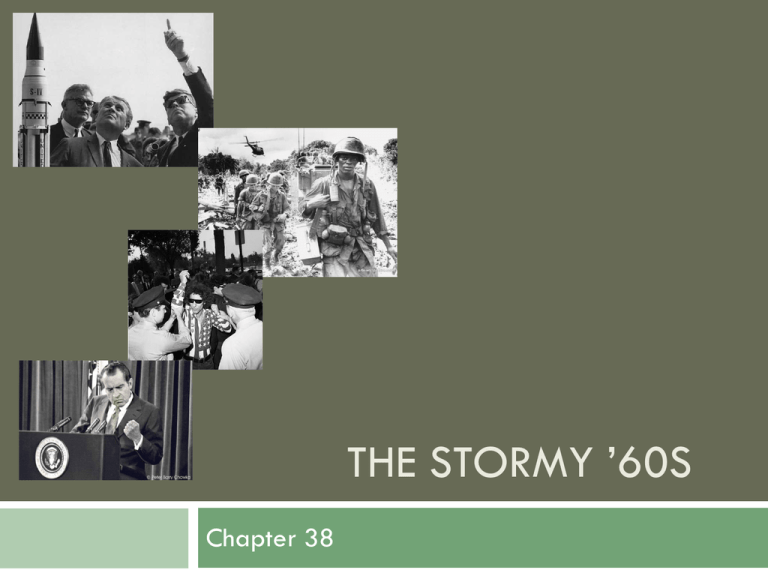
THE STORMY ’60S Chapter 38 Kennedy’s “New Frontier” Spirit JFK is the youngest President elected, World War II hero, Harvard educated, from a wealthy family Cabinet is young, mostly Harvard educated, called his “brain trust” Brother Bobby is Attorney General Wants to be a more active president, calls his vision for America the New Frontier Kennedy inspires idealism Peace Corps is an army of idealistic volunteers that bring “first world” skills to Third World countries The New Frontier At Home JFK had only a narrow Democratic majority in Congress; hard to get proposals through Congress Kennedy has problem with conservative Southern Democrats Most of his social legislation is axed by Congress Kennedy’s disputes with Big Business They see him as unfriendly Kennedy does cut taxes though Announces project to put a man on the Moon. Costs 24 billion, but was successful in 1969. Rumblings In Europe June 1961 Kennedy meets with Khrushchev in Vienna Berlin Dispute Khrushchev threatens to cut off Western access to Berlin to keep population of Berlin from going to democratic West 1961 begins construction of Berlin Wall Becomes symbol of Soviet domination and repression of E. Europe Stubborn French Kennedy European tariff policy He cut tariffs up to 50% to promote trade between Europe and the U.S. French refuse to participate They fear American domination of Europe French develop their own nuclear arsenal and want a Europe free of American influence “Flexible Response” With the end of colonization, the newly independent colonies became a headache as they flared into civil wars. Congo Laos Leads Kennedy to move away from Ike’s “massive retaliation” and to adopt the doctrine of “flexible response” develop an array of military responses that can be precisely calibrated to the gravity of the crisis. Kennedy increases military spending and bolstered the special forces. Stepping into the Vietnam Quagmire Corrupt right-wing, pro-US government in South Vietnam. Communists in the south, Viet-Cong, waging guerrilla civil war. Late 1961 Kennedy sharply increases US military advisors Coup against South Vietnamese leader. U.S. steps into Vietnam to foster political stability Kennedy increases military and economic aid Modernization theory- believed that traditional societies could develop into industrial, democratic nations by following the Western nations path Cuban Confrontations Latin American countries saw the U.S. as a bully Alliance for Progress Marshall Plan for Latin America to provide aid for economic development doesn’t have much effect. Bay of Pigs Invasion CIA backed plan to topple communist government in Cuba April 1961 invasion at Bay of Pigs was a failure Kennedy assumes full responsibility. Pushed the Cubans further toward the Soviets Cuban Missile Crisis Castro pushed into the arms of the Soviets. October 1962 Khrushchev starts to install nuclear tipped missiles in Cuba Spy photos reveal the missiles Plan was to keep pressure on the US to back down on issues in other parts of the world Kennedy rejects air strike; instead orders a military blockade and demands immediate removal of missiles. Russian ships and quarantine line Khrushchev finally blinks when he agreed to a compromise. Pulls missiles out of Cuba US agrees to not attack Cuba and to pull missiles out of Europe targeted at Soviet Union Seems to be a clear US victory Missile Crisis Fallout Khrushchev forced out of power Kremlin begins an aggressive program of military expansion; New Arms Race Democrats gain in the midterm elections. Kennedy begins to push for arms control and greater communications between Russia and the US. Hotline Ban on above-ground nuclear tests agreed to in 1963 Kennedy urges Americans to live with the Soviets as they are and find a method of peaceful coexistence. Origins of the policy of Détente. The Struggle For Civil Rights Kennedy moved very slowly on Civil Rights Events forced the President’s hand. Lack of southern Congressional support Freedom Riders tried to end segregation in facilities serving bus passengers After violent incidents federal marshals were sent to protect Freedom Riders Kennedy works with SCLC to promote civil rights and to register black voters Civil Rights Violence Integrating Southern universities. Spring 1963 King begins a campaign against discrimination in Birmingham. Police reaction Kennedy forced to send in 3000 troops. Attacked protesters with dogs and fire hoses All seen on TVs across the country June 11, 1963 Kennedy responds. Calls for new Civil Rights legislation Calls problem a moral issue I Have a Dream Medger Evers black civil rights worker is killed August 1963, March on Washington and King’s “I have a Dream” Speech September 1963 bombing of black Birmingham church kills 4 black girls at Sunday School Kennedy’s Civil Rights Bill was making little headway and many African Americans were growing impatient THE KILLING OF KENNEDY November 22, 1963 Kennedy is shot in Dallas Johnson takes over as president The LBJ Brand On The Presidency Lyndon Johnson was profane, earthy, vain, idealistic Master politician; former Senate Majority Leader in the Senate. Johnson’s Great Society Johnson puts power behind Civil Rights Bill. Civil Rights Act of 1964. Prohibits discrimination in facilities open to the public Strengthened power to end segregation in schools Created federal Equal Employment Opportunity Commission Prevents both race and gender discrimination. Southern Senators try to kill with a lengthy filibuster. Johnson launches a billion dollar war on poverty designed to help those not yet getting the benefits of America’s vast wealth. Dubbed the Great Society Program. Medicare/Medicade central pillar New Deal type economic and welfare measures designed to free Americans from poverty and social injustice Johnson Battles Goldwater In 1964 Johnson is easily nominated in 1964; runs on a very liberal platform. Republicans nominate Senator Barry Goldwater very, very conservative. Strongly anti-red, strongly anti-New Deal. Believes in small national government (Jeffersonian) Wanted American field commanders to have authority to use tactical nukes in the battle field. Johnson convinces national that Goldwater “scary” “In your heart you know he’s right” vs. “In your gut you know he’s nuts” Johnson wins biggest landslide in US history. Tonkin Gulf Resolution Tonkin Gulf incident August 1964 Johnson calls attack by North Vietnamese on U.S. Navy ship unprovoked Orders air raids on North Vietnam Johnson uses to get Tonkin Gulf Resolution from Congress Consequences? Gives the president a virtual blank check to use force in Southeast Asia against the North Vietnamese. Gives Johnson discretion to widen the war, which he does after the election. The Great Society Congress Johnson has 2-1 democratic majority in both houses of Congress. Legislative slate passed by Johnson after the 1964 election was comparable to FDR’s 100days. Sweeping package of social reform and new aid to the poor and down-trodden. Continues the war on poverty Created the Dept. of Transportation and Housing and Urban Development. Names the first Black cabinet secretary—Robert Weaver Creates national Endowment for the Arts Legislative Landmarks Four legislative achievements at heart of Great Society: Federal Aid to Education Medicare for the Elderly/Medicaid for the Poor Immigration Reform Voting Rights Act Medicare and Medicaid provide medical insurance at governmental expense for elderly and poor Medicare and Medicaid join social security and unemployment insurance as part of social safety net Despite critics poverty did decline and general health conditions improved for many Americans Voting Rights Act In 1964 Voting Rights becomes the main goal of civil rights movement. Passage of 24th Amendment Freedom Summer of 1964 was a massive voter registration drive in Mississippi Three civil rights workers were murdered MLK resumed voter registration drive in AL, “March to Selma” Voting Rights Act of 1965. Johnson sends in federal officials to oversee voter registration. Over the next 25 years totally transforms the south because blacks are voting. Black Power Voting Rights Act ends era of non-violence for civil rights movement Civil Right movement moves north and out of the control of MLK, becomes more militant and violent 1965—Watts riots. New voices advocate confrontation, violence and separatism. Malcolm X Stokely Carmichael Black Panthers Riots across the US in 1967, all shown on TV Many white Americans become outraged Civil Rights Movement increasingly focuses on economic demands MLK assassinated in 1968; wisest black voice gone. Vietnam Escalation 1965 Johnson escalates the war Operation Rolling Thunder Starts bombing and the use of troops on the ground. War becomes Americanized By end of 1965, 184,000 America troops; 1968 almost 500,000 Believes American escalation will show US resolve and north will back down. Believes in domino theory The fall of one non-communist state would cause neighboring countries to become communist as well US casualties start to mount, end is nowhere in sight Vietnam Vexations World opinion was turning against the US Appeared that US was beating up a thirdworld nation over US zeal to spank communism. Made it harder for US to respond elsewhere Hawks vs. Doves Six Day War (Israel and Egypt) Led to a lot of domestic discontent. Many blamed Johnson. Major protests in San Francisco, New York and on college campuses. Anti-war demonstrations gradually mounted on campuses. Draft resisters flee to Canada, burn draft cards, burn flags Quagmire By late 1960s opposition to the war was hardening. 1966-1967 Fulbright hearings. Public feels increasingly misled about the war and ability to win. By 1968 had become the longest and most unpopular foreign war in US history. Government had failed to adequately explain why we were fighting there and/or what was at stake. Johnson, orders the CIA to spy on American anti-war activists. FBI turns against peace groups Johnson stubbornly continues to assert that victory is just around the corner. Vietnam Topples Johnson Jan. 1968 Tet offensive Political and psychological victory for the Viet Cong Military demands 200,000 more troops. Johnson challenged from within his party by Eugene McCarthy and Robert Kennedy. March 1968 Johnson’s announcement he would not run for the presidency 1968 Election Chaos Hubert Humphrey front-runner for the democratic nomination. Strong challenge from Robert Kennedy. June 1968 Kennedy assassinated after primary victory in California Convention Chaos 1968 Democratic convention in Chicago in chaos. Democrats were bitter, divided and angry over the death of Kennedy, the war, etc. Many young, radical, anti war protester showed up to vent their frustration The Chicago police and demonstrators clashed outside of the convention Democrats came off looking like a disorganized, fratricidal mob. Humphrey wins the nomination on the first ballot. Richard Nixon and George Wallace Republicans nominate Richard Nixon who is running as a conservativemoderate. Platform Tough on crime, , “hawk” on Vietnam Supported by white, conservative southern Democrats George Wallace American Independent Party. Wallace ardently anti-integration “Segregation Now, Segregation tomorrow, Segregation forever.” Victory For Nixon Nixon and Humphrey have similar policies on VN. No real choice between the two. As a result, many doves sat out the election because no standard-bearer for their views. Nixon wins by half a percentage point without carrying a single major city and with no coat-tails. Both houses of Congress remain Democratic. Democrats win 95% of the black vote. Nixon wins only 43% of the vote because Wallace had siphoned off votes from both. No mandate. Wallace wins 46 electoral votes from the deep south. Largest third-party electoral vote in American history. Cultural Upheaval 1960s become a dividing line of two different era of morals, values and behavior Vietnam, Civil Rights Struggle and materialism undermine faith of youth in government and “establishment” Roots in the 1950s among the “beats” who voiced disillusionment with material pursuits Division also appeared between more educated and less educated Americans Idea of shared purpose seemed to be losing its grip Cultural Upheaval Organized students movements against established authority 1964 Free Speech movement in Berkley 1968 Students for Democratic Society were anti-war and anti poverty; eventually became a domestic terrorist group the Weather Underground Many young people became political and cultural rebels Many protests fueled by outrage over Vietnam Became opposed to traditional American values, developed their own counterculture Sexual Revolution (development of birth control?) , gay rights also became issues at this time
